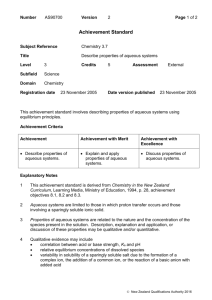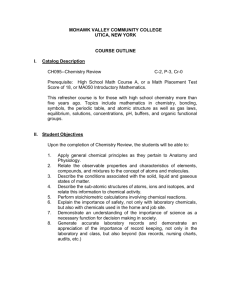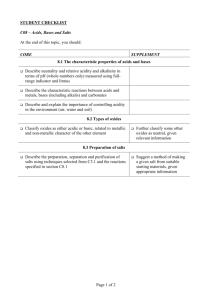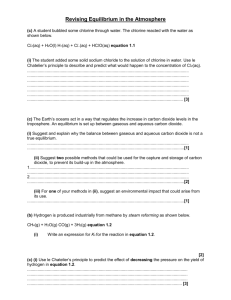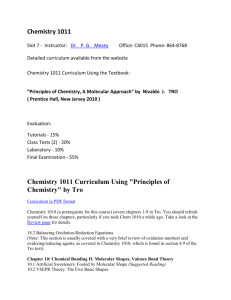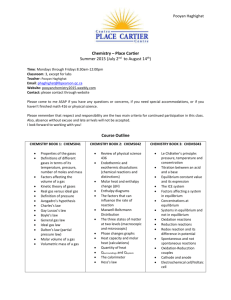54KB - NZQA
advertisement
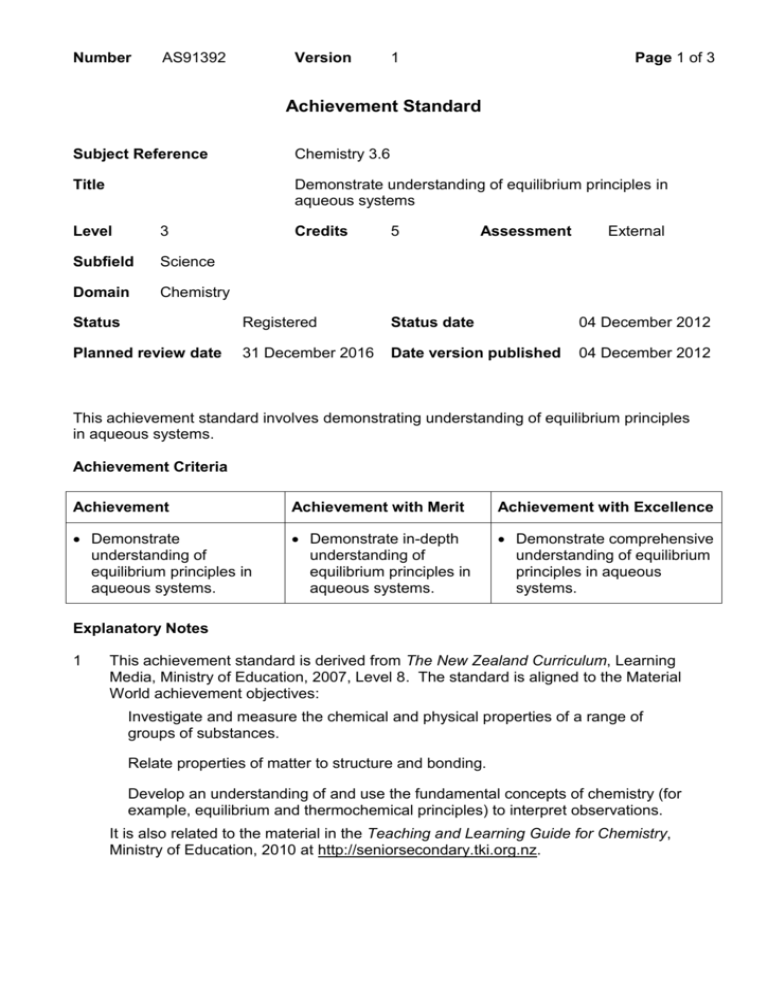
Number AS91392 Version 1 Page 1 of 3 Achievement Standard Subject Reference Chemistry 3.6 Title Demonstrate understanding of equilibrium principles in aqueous systems Level 3 Subfield Science Domain Chemistry Credits 5 Assessment External Status Registered Status date 04 December 2012 Planned review date 31 December 2016 Date version published 04 December 2012 This achievement standard involves demonstrating understanding of equilibrium principles in aqueous systems. Achievement Criteria Achievement Achievement with Merit Achievement with Excellence Demonstrate understanding of equilibrium principles in aqueous systems. Demonstrate in-depth understanding of equilibrium principles in aqueous systems. Demonstrate comprehensive understanding of equilibrium principles in aqueous systems. Explanatory Notes 1 This achievement standard is derived from The New Zealand Curriculum, Learning Media, Ministry of Education, 2007, Level 8. The standard is aligned to the Material World achievement objectives: Investigate and measure the chemical and physical properties of a range of groups of substances. Relate properties of matter to structure and bonding. Develop an understanding of and use the fundamental concepts of chemistry (for example, equilibrium and thermochemical principles) to interpret observations. It is also related to the material in the Teaching and Learning Guide for Chemistry, Ministry of Education, 2010 at http://seniorsecondary.tki.org.nz. Number 2 AS91392 Version 1 Page 2 of 3 Demonstrate understanding involves describing, identifying, and giving an account of aqueous systems using equilibrium principles. This requires the use of chemistry vocabulary, symbols, and conventions and may include related calculations. Demonstrate in-depth understanding involves using equilibrium principles to explain properties of aqueous systems. This requires explanations that use chemistry vocabulary, symbols, and conventions and may include related calculations. Demonstrate comprehensive understanding involves elaborating, justifying, relating, evaluating, comparing and contrasting, or analysing properties of aqueous systems in terms of equilibrium principles. This requires the consistent use of chemistry vocabulary, symbols, and conventions and may include related calculations. 3 Aqueous systems are limited to those involving sparingly soluble ionic solids and acidic and basic solutions (in which proton transfer occurs). 4 Equilibrium principles in aqueous systems are limited to qualitative descriptions and/or calculations involving: relative concentrations of dissolved species sparingly soluble ionic solids relating solubility to Ks solubility of solids in water and in solutions already containing one of the ions A or B (a common ion) or due to the formation of a complex ion, or the reaction of a basic anion with added acid predicting precipitation or dissolution acidic and basic solutions (includes buffers) acid/base strength, Ka (pKa) concentration of species present in weak acidic and/or basic solutions (includes buffers) relating concentration of species to pH and conductivity titration curves to represent an acid-base system including selection of indicators (titrations of weak acids with weak bases are excluded). 5 Sparingly soluble ionic solids are limited to AB, A2B and AB2 types where neither of the ions A nor B reacts further with water. 6 Acidic and basic solutions are monoprotic acids, bases, salts, and buffers (those in which the extent of reaction is small so that the equilibrium concentration of a dissolved weak acid or base can be approximated by the initial concentration). 7 Assessment Specifications for this achievement standard can be accessed through the Chemistry Resources page found at http://www.nzqa.govt.nz/qualificationsstandards/qualifications/ncea/subjects/. Replacement Information This achievement standard replaced AS90700. Number AS91392 Version 1 Page 3 of 3 Quality Assurance 1 Providers and Industry Training Organisations must have been granted consent to assess by NZQA before they can register credits from assessment against achievement standards. 2 Organisations with consent to assess and Industry Training Organisations assessing against achievement standards must engage with the moderation system that applies to those achievement standards. Consent and Moderation Requirements (CMR) reference 0233
